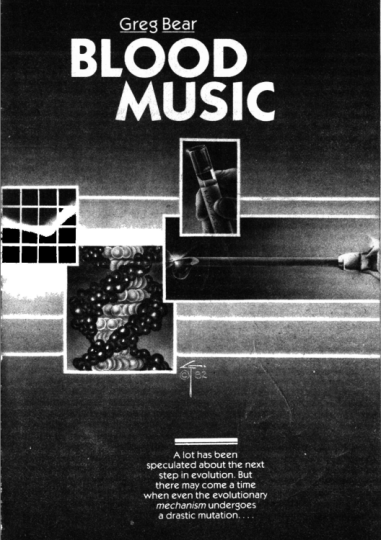This month’s Young People Read Old Hugo Finalists is Greg Bear’s 1983Blood Music. As many readers may be aware, Bear recently died. That makes this Young People either well timed or just slightly too belated. Blood Music is a tale of Virgil, a visionary scientist advances human knowledge by millennia overnight or who creates existential threat to the human race, depending on one’s perspective. It is a tribute to how much one can accomplish simply by rejecting basic laboratory safety guidelines.
First published in the June 1983 issue of Analog Science Fiction/Science Fact, Blood Music in its original novelette form won not just a Hugo1but a Nebula2 as well. 1985’s Prix-Apollo-winning novel-length expansion, which also used the title Blood Music, was not as success at winning awards as its shorter version. The novel compensated for the lack of wins with a wealth of nominations. The novel was a finalist for the 1986 Locus for Best SF Novel, the 1986 Campbell Memorial for Best Science Fiction Novel3, the 1986 Hugo for Best Novel4, the 1986 BSFA for Best Novel5, and the 1986 Nebula for Best Novel6.
All very impressive. However, the Young People have been resistant to stories that wowed their elders. How, then, did they react to this story?
Note: Young People would like to add to its ranks of young people. If you’re under 35, and would like to take part, please email me at jdnicoll at panix dot com.
1: Beating The Monkey Treatment by George R. R. Martin, The Sidon in the Mirror by Connie Willis, Slow Birds by Ian Watson, and Black Air by Kim Stanley Robinson
2: Beating Black Air by Kim Stanley Robinson, Blind Shemmy by Jack Dann, Cicada Queen by Bruce Sterling, Slow Birds by Ian Watson, The Monkey Treatment by George R. R. Martin, and The Sidon in the Mirror by Connie Willis.
3: Losing to David Brin’s The Postman, edged out by Kurt Vonnegut’s Galápagos, and edging out Keith Roberts’ Kiteworld.
4: Losing to Ender’s Game by Orson Scott Card, and edged out by Cuckoo’s Egg by C. J. Cherryh, The Postman by David Brin, and Footfall by Larry Niven and Jerry Pournelle.
5: Losing to The Ragged Astronauts by Bob Shaw and edging out Count Zero by William Gibson, Queen of the Statesby Josephine Saxton, and Schismatrix by Bruce Sterling.
6: Losing to Ender’s Game by Orson Scott Card, and edging out Dinner at Deviant’s Palace by Tim Powers, Helliconia Winter by Brian W. Aldiss, Schismatrix by Bruce Sterling, The Postman by David Brin, and The Remaking of Sigmund Freud by Barry N. Malzberg.
Kris:
Blood Music is a surprisingly good novelette. The concept is an old one (reminding me of Ted Thomas’ The Clone from the 50s) and it is very much done in the standard Analog style of problem story. What allows Bear to elevate it for me is the sense of atmosphere he gives it. Rather than being distant and static, as many of these kinds of stories feel, the sense of impending dread builds carefully through it to the horrifying end. Great stuff.
Brian:
Maybe the original nanotech story, although the little things aren’t called that. Was my first and for a long time only Greg Bear story. In hindsight I’m amazed he was able to practice both hard-headed Campbellian SF and more literary stuff with elegance. “Blood Music” is very readable and continues to be famous because it’s a simple idea executed confidently.
It has a narrator who’s a bit of a smartass but by no means a douche, resulting in some humor being sprinkled across what is essentially a cautionary tale about the unintended consequences of invention. It also has one of the great endings in the whole genre. Bear hits a home run with those last few lines, capping off what is probably still his most famous single work. Future rereads are inevitable.

